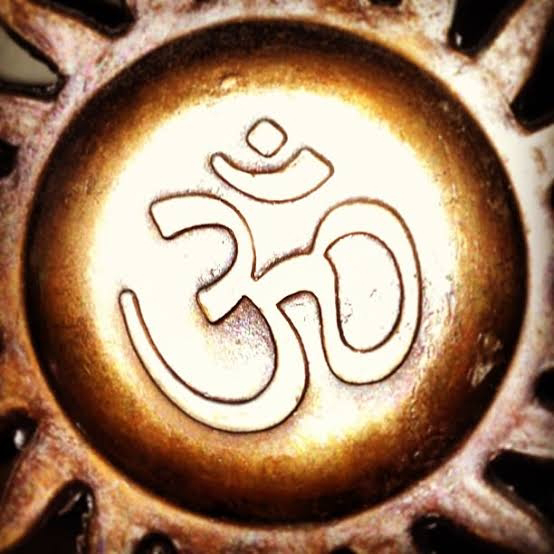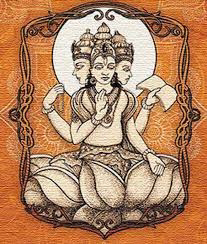सुकेशा च भारद्वाजः शैब्यश्च सत्यकामः सौर्यायणी च गार्ग्यः कौसल्यश्चाश्वलायनो भार्गवो वैदर्भिः कबन्धी कात्यायनस्ते हैते ब्रह्मपरा ब्रह्मनिष्ठाः परं ब्रह्मान्वेषमाणा एष ह वै तत्सर्वं वक्ष्यतीति ते ह समित्पाणयो भगवन्तं पिप्पलादमुपसन्नाः ॥१॥
I-1: Sukesa, son of Bharadvaja; Satyakama, so of Sibi; the grandson of Surya, born of the family of Garga; Kausalya, so of Asvala; a scion of the line of Bhrigu, born in Vidarbha; and Kabandhi, descendant of Katya - all these, who were devoted to (the inferior) Brahman, engaged in realising (the inferior) Brahman, and intent on a search of the supreme Brahman, approached with faggots in hand, the venerable Pippalada with the belief, "This one will certainly tell us all about It."
भरद्वाज पुत्र सुकेशा, शिबिकुमार सत्यकाम, गर्ग गोत्र में उत्पन्न सौर्यायणी, कौसलदेशीय आश्वलायन, विदर्भदेशीय भार्गव और कत्य का प्रपौत्र कबन्धी - ये ब्रह्मपरायण और ब्रह्मनिष्ठ सभी ब्रह्म की खोज करते हुए भगवन पिप्पलाद ऋषि के पास यह सोचकर कि ये हमें उस विषय में सब बताएँगे, हाथ में समित्पाणि लेकर गए ॥१॥
तन् ह स ऋषिरुवच भूय एव तपसा ब्रह्मचर्येण श्रद्धया संवत्सरं संवत्स्यथ यथाकामं प्रश्नान् पृच्छत यदि विज्ञास्यामः सर्वं ह वो वक्ष्याम इति ॥२॥
I-2: To them the seer said, "Live (here) again for a year in a fitting manner, with control over the senses and with brahmacharya and faith. Then put questions as you please. If we know, we shall explain all your questions."
उन सभी से ऋषि ने कहा - तपस्या, ब्रह्मचर्य और श्रद्धा से युक्त होकर एक वर्ष तक यहाँ निवास करो, फिर अपनी इच्छानुसार प्रश्न करना, यदि मैं जानता होऊँगा तो तुम्हें वह सब बतला दूँगा ॥२॥
अथ कबन्धी कत्यायन उपेत्य पप्रच्छ । भगवन् कुते ह वा इमाः प्रजाः प्रजायन्त इति ॥३॥
I-3: After that Kabandhi, descendant of Katya, having approached (him) asked, "Venerable sir, from what indeed are all these beings born?"
अब कत्य प्रपौत्र कबन्धी ने उनके पास जाकर पूछा - भगवन् ! किससे यह सम्पूर्ण प्रजा उत्पन्न होती है ॥३॥
तस्मै स होवाच प्रजाकामो वै प्रजापतिः स तपोऽतप्यत स तपस्तप्त्वा स मिथुनमुत्पादयते । रयिं च प्रणं चेत्येतौ मे बहुधा प्रजाः करिष्यत इति ॥४॥
I-4: To him he said: The Lord of all creatures became desirous of progeny. He deliberated on (past Vedic) knowledge. Having brooded on that knowledge, He created a couple - food and Prana - under the idea, "These two will produce creatures for me in multifarious ways."
वे उससे बोले - प्रजा उत्पन्न करने की इच्छा से प्रजापति ने ही तप किया । उसने तपस्या करके रयि और प्राण का यह जोड़ा उत्पन्न किया - ये दोनों ही मेरी अनेक प्रकार की प्रजा को उत्पन्न करेंगे ॥४॥
आदित्यो ह वै प्राणो रयिरेव चन्द्रमा रयिर्वा एतत् सर्वं यन्मूर्तं चामूर्तं च तस्मान्मूर्तिरेव रयिः ॥५॥
I-5: The sun is verily Prana; and food is verily the moon. Whatever is gross or subtle is but food. The gross, as distinguished from that (subtle), is certainly food (of the subtle).
आदित्य ही प्राण है और चंद्रमा ही रयि है । यह जो कुछ भी मूर्त (स्थूल) और अमूर्त (सूक्ष्म) है, सब रयि है अर्थात् मूर्तमात्र ही रयि है ॥५॥
अथादित्य उदयन्यत्प्राचीं दिशं प्रविशति तेन प्राच्यान् प्राणान् रश्मिषु सन्निधत्ते । यद्दक्षिणां यत् प्रतीचीं यदुदीचीं यदधो यदूर्ध्वं यदन्तरा दिशो यत् सर्वं प्रकाशयति तेन सर्वान् प्राणान् रश्मिषु सन्निधत्ते ॥६॥
I-6: Now then, the fact that the sun, while rising, enters into the eastern direction, thereby it absorbs into its rays all the creatures in the east. That it enters into the south, that it enters into the west, that it enters into the north, that it reaches the nadir and the zenith, that it enters the intermediate points of the zodiac, that it illumines all, thereby it absorbs all living things into its rays.
उदय होता हुआ सूर्य जब पूर्व दिशा में प्रवेश करता है तो उससे वह पूर्व दिशा के प्राण को अपनी किरणों में धारण करता है । उसी प्रकार जब वह दक्षिण, पश्चिम, उत्तर, नीचे, ऊपर और अवान्तर दिशाओं को प्रकाशित करता है उन सबके प्राण को भी अपनी किरणों में धारण करता है ॥६॥
स एष वैश्वानरो विश्वरुपः प्राणोऽग्निरुदयते । तदेतदृचाऽभ्युक्तम् ॥७॥
I-7: That very one rises up who is Prana and fire, who is identified with all creatures, and who is possessed of all forms. This very one, that has been referred to, is spoken of by the mantra:
वह यह सूर्य ही उदय होता हुआ वैश्वानर और विश्वरूप प्राण अग्नि है । यही बात ऋचा द्वारा भी कहते हैं ॥७॥
विश्वरूपं हरिणं जातवेदसं परायणं ज्योतिरेकं तपन्तम् । सहस्ररश्मिः शतधा वर्तमानः प्राणः प्रजानामुदयत्येष सूर्यः ॥८॥
I-8: (The realisers of Brahman) knew the one that is possessed of all forms, full of rays, endowed with illumination, the resort of all, the single light (of all), and the radiator of heat. It is the sun that rises - the sun that possesses a thousand rays, exists in a hundred forms and is the life of all creatures.
विश्वरूप, रश्मिवान, सर्वज्ञ, सर्वाधार, ज्योतिर्मय वह तपता हुआ सूर्य अद्वितीय है । वह सूर्य ही सहस्त्रों किरणोंवाला होकर, सैकड़ों प्रकार से वर्तमान प्रजाओं के प्राणरूप से उदित होता है ॥८॥
संवत्सरो वै प्रजापतिस्तस्यायने दक्षिणं चोत्तरं च । तद्ये ह वै तदिष्टापूर्ते कृतमित्युपासते ते चान्द्रमसमेव लोकमभिजयन्ते । त एव पुनरावर्तन्ते तस्मादेत ऋषयः प्रजाकामा दक्षिणं प्रतिपद्यन्ते । एष ह वै रयिर्यः पितृयाणः ॥९॥
I-9: The year is verily the Lord of creatures. Of Him there are two Courses, the Southern and the Northern. As to that, those, who follow, in that way, the sacrifices and public good etc., that are products of action, conquer the very world of the moon. It is they who come back. (Since this is so), hence these seers of heaven, who are desirous of progeny, attain the Southern Course. That which is the Course of the Manes is verily food.
संवत्सर ही प्रजापति है । दक्षिण और उत्तर उसके दो अयन हैं । जो इष्ट और पूर्त कर्मो की ही उपासना करते हैं । वे चन्द्रलोक पर ही विजय पाते हैं । वे ही पुनः आवागमन को प्राप्त होते हैं । अतः ये प्रजाकामी ऋषिगण दक्षिण मार्ग को प्राप्त होते है । यही वह रयि है, यही पितृयाण है ॥९॥
अथोत्तरेण तपसा ब्रह्मचर्येण श्रद्धया विद्ययाऽऽत्मानमन्विष्यादित्यमभिजयन्ते । एतद्वै प्राणानामायतनमेतदमृतमभयमेतत् परायणमेतस्मान्न पुनरावर्तन्त इत्येष निरोधस्तदेष श्लोकः ॥१०॥
I-10: Again, by searching for the Self through the control of the senses, brahmacharya, faith and meditation, they conquer the sun (by proceeding) along the Northern Course. This is the resort of all that lives; this is indestructible; this is fearless; this is the highest goal, for from this they do not come back. This is un-realisable (to the ignorant). Pertaining to this here is a verse:
तथा जो तप, ब्रह्मचर्य, श्रद्धा, और विद्या द्वारा आत्मा की खोज करते हैं, वे उत्तर मार्ग द्वारा सूर्यलोक को प्राप्त होते हैं । यही प्राणों का आश्रय है, यही अमृत है, यही अभय है, और यही परम गति है । इससे फिर लौटना नहीं होता । अतः यही निरोध है । इस विषय में यह श्लोक है ॥१०॥
पञ्चपादं पितरं द्वादशाकृतिं दिव आहुः परे अर्धे पुरीषिणम् । अथेमे अन्य उ परे विचक्षणं सप्तचक्रे षडर आहुरर्पितमिति ॥११॥
I-11: Some talk of (this sun) as possessed of five feet, as the father, as constituted by twelve limbs, and as full of water in the high place above the sky. But there are these others who call him the omniscient and say that on him, as possessed of seven wheels and six spokes, is fixed (the whole universe).
कई अन्य इसे पाँच पाद वाला, सबका पिता, बारह आकृतियों वाला, जल का उत्पादक, देवलोक से भी ऊँचा स्थित बताते हैं । कई अन्य उस परे होकर भी सबको जानने वाले को सात चक्रों और छः अरों पर बैठा हुआ बताते हैं ॥११॥
मासो वै प्रजापतिस्तस्य कृष्णपक्ष एव रयिः शुक्लः प्रणस्तस्मादेत ऋषयः शुक्ल इष्टं कुर्वन्तीतर इतरस्मिन् ॥१२॥
I-12: The month verily is the Lord of all creatures. The dark fortnight is His food, and the bright His Prana. Therefore these seers perform the sacrifices in the bright fortnight. The others perform it in the other.
मास ही प्रजापति है । उसका कृष्णपक्ष ही रयि है एवं शुक्लपक्ष प्राण है । अतः ये ऋषिगण शुक्लपक्ष में ही इष्ट कर्म करते हैं तथा वे दूसरे उस दूसरे पक्ष में ॥१२॥
अहोरात्रो वै प्रजापतिस्तस्याहरेव प्राणो रात्रिरेव रयिः प्राणं वा एते प्रस्कन्दन्ति ये दिवा रत्या संयुज्यन्ते ब्रह्मचर्यमेव तद्यद्रात्रौ रत्या संयुज्यन्ते ॥१३॥
I-13: Day and night are verily the Lord of all creatures. Day is surely His Prana and night is certainly the food. Those who indulge in passion in the day, waste away Prana. That they give play to passion at night is as good as celibacy.
दिन-रात भी प्रजापति है । उसका दिन ही प्राण है और रात्रि ही रयि है । जो दिन में रति हेतु संयुक्त होते हैं, वे अपने ही प्राण को क्षीण करते हैं और जो रात्रि में रति के लिए संयुक्त होते हैं, वह तो ब्रह्मचर्य ही है ॥१३॥
अन्नं वै प्रजापतिस्ततो ह वै तद्रेतस्तस्मादिमाः प्रजाः प्रजायन्त इति ॥१४॥
I-14: Food is nothing but the Lord of all creatures. From that indeed issues that human seed. From that are born all these beings.
अन्न ही प्रजापति है । अन्न से ही वीर्य उत्पन्न होता है और उस वीर्य से ही यह प्रजा उत्पन्न होती है ॥१४॥
तद्ये ह वै तत् प्रजापतिव्रतं चरन्ति ते मिथुनमुत्पादयन्ते । तेषामेवैष ब्रह्मलोको येषां तपो ब्रह्मचर्यं येषु सत्यं प्रतिष्टितम् ॥१५॥
I-15: This being so, those who undertake the well-known vow of the Lord of all creatures, beget both sons and daughters. For them alone is this world of the moon in whom there are the vows and continence, and in whom is found for ever avoidance of falsehood.
जो भी इस प्रकार उस प्रजापतिव्रत का आचरण करते हैं, वे मिथुन को उत्पन्न करते हैं । उन्ही के लिए यह ब्रह्मलोक है, जिनमें तप है, ब्रह्मचर्य है, और जिनमे सत्य प्रतिष्ठित है ॥१५॥
तेषामसौ विरजो ब्रह्मलोको न येषु जिह्ममनृतं न माया चेति ॥१६॥
I-16: For them is that taintless world of Brahman, in whom there is no crookedness no falsehood, and no dissimulation.
उन्ही के लिए यह रज-रहित ब्रह्मलोक है, जिनमें कुटिलता, अनृत और और माया नहीं है ॥१६॥










